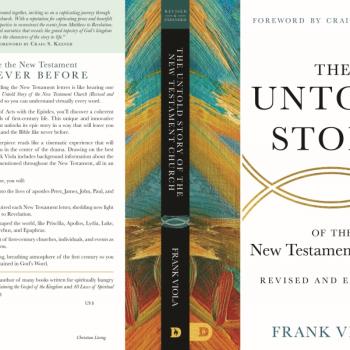Also, Lincoln was a really interesting character. Everyone likes to claim Lincoln for themselves. It's important to recognize that Lincoln had an important role as leader of the nation, which we all know already, but the fact that he had this personal spiritual journey at the same time was new to me, and will, I think, be new to people watching. Our goal was to understand the Civil War with a religious lens applied to it -- something that hasn't been done before. For example, the Ken Burns series about the Civil War doesn't mention religion at all.
Episode four (the second hour of Night #2), I think, is where we start to see ourselves, in terms of a more modern America, and the country is no longer as predominantly Protestant as it is up until that point. The key idea was that we end up splitting into two camps. The culture wars that we still live with today began around the 1920s with the Scopes Trial. We always knew we'd cover the Scopes trial, so we built up to that trial -- to get at what it meant for how religion was understood within the public realm.
What do you want audiences to take away from watching this film?
I'm interested and excited to hear what people think of it. It's such a charged topic in American life -- depending on what your politics are, and what your religion is, how you see it. What I hope from the audience is that they'll see that religion has been part of our history, in that it's always been an aspect of how we shape the nation, and in order to understand our history, we need to understand how religion has played a role.
There's been a lot of talk of whether we were a "Christian nation" originally and why we don't "face up" to that. I hope that by understanding the history, people will see that's not accurate, but it's important to recognize the elements of religion and how crucial they are to who we are.
What moments stand out with particular poignancy for you, either from the film itself or the making of it?
In making the film, one experience that really stands out for me is working with slave interpreters down in South Carolina, where we did some filming for hour three. I was lucky to work with an amazing woman who does slave interpretation at an historical plantation. Talking with her about her experience as a black woman playing a slave, that was an amazing experience, to work with her and others.
We also re-enacted a "hush harbor" religious meeting in the woods at night that didn't end up in the film. That was one of the ways slaves would practice Christianity in the 19th century.
Within the series, I find the moment very moving when Abraham Lincoln has come to the conclusion that he has to emancipate the slaves and end slavery, and do whatever it takes to do that. That decision definitely involved his grappling with what God wanted for the United States. I didn't really understand that before making the movie. I found that very moving, and hopefully others will as well.
Read more from Patheos' coverage of the PBS Series: God In America here.




